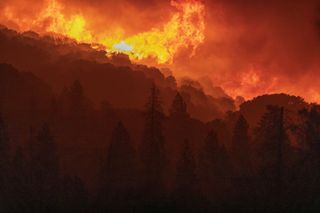Record-breaking 2.2 million acres burned by California wildfires
There are more than 14,000 firefighters working across the state to contain around 25 major fires.

California is having a record-breaking year of flames, as dozens of wildfires have set the state ablaze.
Wildfires have burned more than 2.2 million acres (8,903 square kilometers) across California this year, killing at least eight people and destroying more than 3,300 structures, according to the California Department of Forestry and Fire Protection (Cal Fire). That's an area more than twice the size of Rhode Island.
"This is crazy. We haven't even got into the October and November fire season and we've broken the all-time record," Cal Fire Capt. Richard Cordova told CNN. "It concerns us because we need to get these firefighters off these lines and get them breaks from battling these wildfires."
There are more than 14,000 firefighters working across the state to contain around 25 major fires. Most of the state is under a red flag warning today (Sept. 7) and into tomorrow (Sept. 8), meaning that conditions including strong, gusty winds and low humidity are ideal for wildfire strengthening and spread, according to Cal Fire.
Related: Raging western wildfires in photos
Climate change is increasing the frequency and severity of wildfires in the state and across the globe, according to California Environmental Protection's Agency's Air Resources Board. The area that's burned by wildfires in California has been increasing in size each year since 1950, as temperatures climb, according to the Board. And more than a century of fire suppression practices have left many forests with plants prone to "exceedingly hot fires," according to Cal Fire
The Creek Fire that began burning on Friday (Aug. 4) evening, is 0% contained and has spread across 135,523 acres (548 square km) in the Big Creek drainage area between Shaver Lake, Big Creek and Huntington Lake in the eastern Sierra Nevada mountains. The California Army National Guard had to evacuate more than 200 people who were trapped by the fast-moving fire at the Wagner Mammoth Pool campground, according to the government's Incident Information System.
Sign up for the Live Science daily newsletter now
Get the world’s most fascinating discoveries delivered straight to your inbox.
Yesterday, the Fresno Fire public information office wrote on Twitter that a military helicopter was trying to rescue people trapped by the fire near Lake Edison in the Sierra National Forest, but was unsuccessful due to heavy smoke conditions. But at least 13 people were rescued from the Sierra National Forest overnight, the Army National Guard Col. David Hall said on NBC's "Today" show.
A "pyrotechnic device," that generated smoke during a gender reveal party sparked the El Dorado Fire, which has burned 10,574 acres (42.79 square km) of land in Southern California's San Bernardino County and is currently 16% contained, according to a statement from Cal Fire. Lightning strikes caused most of the other fires, according to NPR.
Some of the worst air quality in the world is currently plaguing the Golden State, with some regions recording "very unhealthy" and "hazardous" levels of smoky particulate matter in the air, according to the U.S. Air Quality Index.
The United States Department of Agriculture Forest Service announced in a statement yesterday (Sep. 7), that it has temporarily closed eight national forests, including the Sierra and Sequoia National Forests due to the "threat of unprecedented and dangerous fire conditions" amid extreme heat, significant wind events, dry conditions and limited firefighting resources as teams tackle fires across the country.
California faced an immense heatwave on Labor Day weekend. Los Angeles County recorded its highest temperature ever at 121 degrees Fahrenheit (49.4 degrees Celsius) on Sunday (Sep. 6), according to a tweet from the National Weather Service Los Angeles.
"The wildfire situation throughout California is dangerous and must be taken seriously. Existing fires are displaying extreme fire behavior, new fire starts are likely, weather conditions are worsening, and we simply do not have enough resources to fully fight and contain every fire," Randy Moore, the Regional Forester for the USDA Forest Service Pacific Southwest Region, said in the Forest Service statement.
Originally published on Live Science.

Yasemin is a staff writer at Live Science, covering health, neuroscience and biology. Her work has appeared in Scientific American, Science and the San Jose Mercury News. She has a bachelor's degree in biomedical engineering from the University of Connecticut and a graduate certificate in science communication from the University of California, Santa Cruz.
Most Popular


